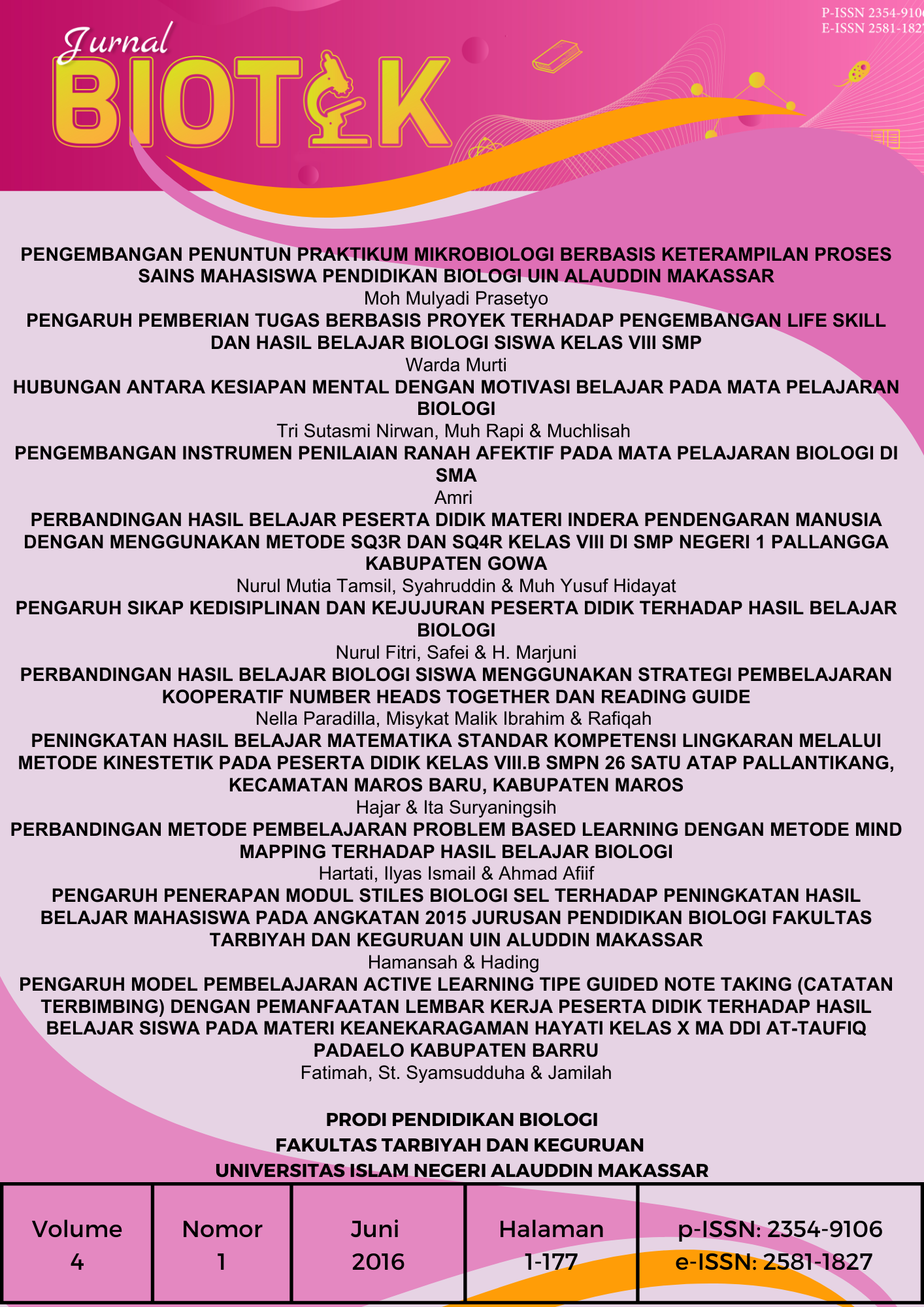PENGARUH PEMBERIAN TUGAS BERBASIS PROYEK TERHADAP PENGEMBANGAN LIFE SKILL DAN HASIL BELAJAR BIOLOGI SISWA KELAS VIII SMP
Abstract
Learning in school tended to focus on teacher until recently. Teacher's jobs is to deliver the subject materials and students learn to memorize all of the knowledge. learning which oriented on the Mastery of the material is only successful in in a short term memorization but fail to solve problems in future time. Project-based learning is used in order to make students active in learning and make teachers as facilitators. Moreover, the implementation of project-based learning will develop students’ life skills.
This study aims at examining the influence of project-based task towards life skill development and learning achievement of grade VIII students in Junior high school (SMP). This study is a quasi experimental, that two samples were given a treatment using different learning methods and observe the influence toward life skill development and students’ learning achievement. The design used was Posttest Only Control Group Design with 37 students as the samples for the control groupn and 37 students as well as the experiment group. Data were collected using observation sheet to measure the life skill, multiple choice test to measure the result of cognitive learning of students. Data were analyzed descriptively and inferentially (t-test statistics with SPSS 17.0 program for Windows, conducted with the level of significant 5%).
The results of study reveal that (1) the project-based task gives influence toward life skill development of grade VIII students and (2) project-based task gives influence toward learning achievement the outcome of Biology of grade VIII students.
Downloads
References
Depdiknas. (2006). Pola Pendidikan Kecakapan Hidup. Surabaya: Swa Bina Qualista Indonesia.
Fahroyin, M. (2010). Pembelajaran Biologi Berorientasi Life Skill Untuk Meningkatkan Aktivitas Dan Hasil Belajar Siswa Sma Kartikatama Metro. Publikasi pada Jurnal Bioedukasi Volume 1, Nomor 2, Nopember 2010. ([email protected] tanggal 31 Agustus 2015)
Hamzah. (2011). Belajar Dengan Pendekatan Pembelajaran Aktif Inovatif Lingkungan Kreatif Efektif Menarik. Jakarta; PT Bumi Aksara
Huda, A, (2009). Peningkatan Mutu Pembelajaran Dengan Pembelajaran Berbasis Proyek.(http://hudaita.com/2009/04/peningkatan-mutu-pembelajaran-dengan.html. diakses 14 Desember 2015)
Mulyasa. (2009). Implementasi Kurikulum Tingkat Satuan Pendidikan. Jakarta: Bumi Aksara.
Slameto. (2003). Belajar dan Faktor-faktor yang Mempengaruhinya. Jakarta: Rineka Cipta.
Sudjiono, A. (2006). Pengantar Statistik Pendidikan. Jakarta; PT. Raja Grafindo.
Sugiyono. (2010). Metode penelitian kuantitatif kualitatif dan R&D. Bandung: Alfabeta.
Sungkono. (2009). Peningkatan Hasil Belajar Mahasiswa Melalui Pembelajaran Berbasis Proyek. Program Studi Teknologi Pendidikan FIP UNY.
Trianto. (2007). Model-model Pembelajaran Inovatif Berorientasi Konstruktivistik. Jakarta: Prestasi Pustaka Publisher.
Zubaedi. (2011). Desain pendidikan karakter konsepsi dan aplikasinya dalam lembaga pendidikan. Jakarta: Kencana prenada media group
Wasis. (2008). Penerapan Metode Pembelajaran Berbasis Proyek untuk Meningkatkan Kualitas Pembelajaran Praktik Industri pada Prodi S-1 PTB. Jurnal Penelitian Kependidikan, Tahun 18, Nomor 1, Oktober 2008. (http://lemlit.um.ac.id. Diakses tanggal 1 September 2014)
Authors who publish with Jurnal Biotek agree to the following terms: Authors retain the copyright and grant Universitas Islam Negeri Alauddin Makassar right of first publication with the work simultaneously licensed under a Creative Commons Attribution License (CC BY-SA 4.0) that allows others to share (copy and redistribute the material in any medium or format) and adapt (remix, transform, and build upon the material) the work for any purpose, even commercially with an acknowledgement of the work's authorship and initial publication in Universitas Islam Negeri Alauddin Makassar. Authors are able to enter into separate, additional contractual arrangements for the non-exclusive distribution of the journal's published version of the work (e.g., post it to an institutional repository or publish it in a book), with an acknowledgement of its initial publication in Universitas Islam Negeri Alauddin Makassar. Authors are permitted and encouraged to post their work online (e.g., in institutional repositories or on their website) prior to and during the submission process, as it can lead to productive exchanges, as well as earlier and greater citation of published work (See The Effect of Open Access).

This work is licensed under a Creative Commons Attribution-ShareAlike 4.0 International License.



